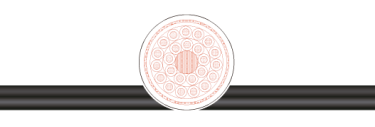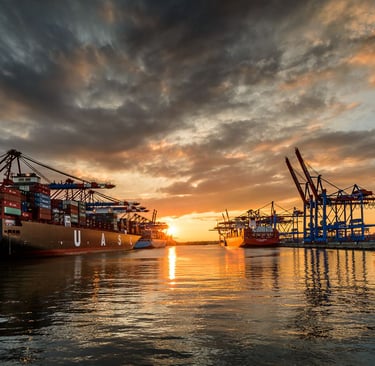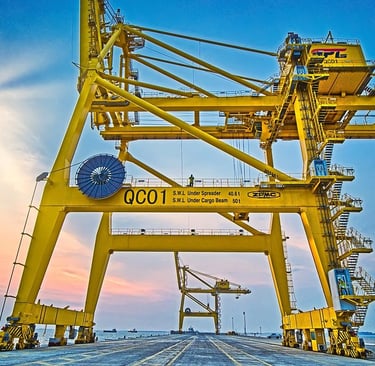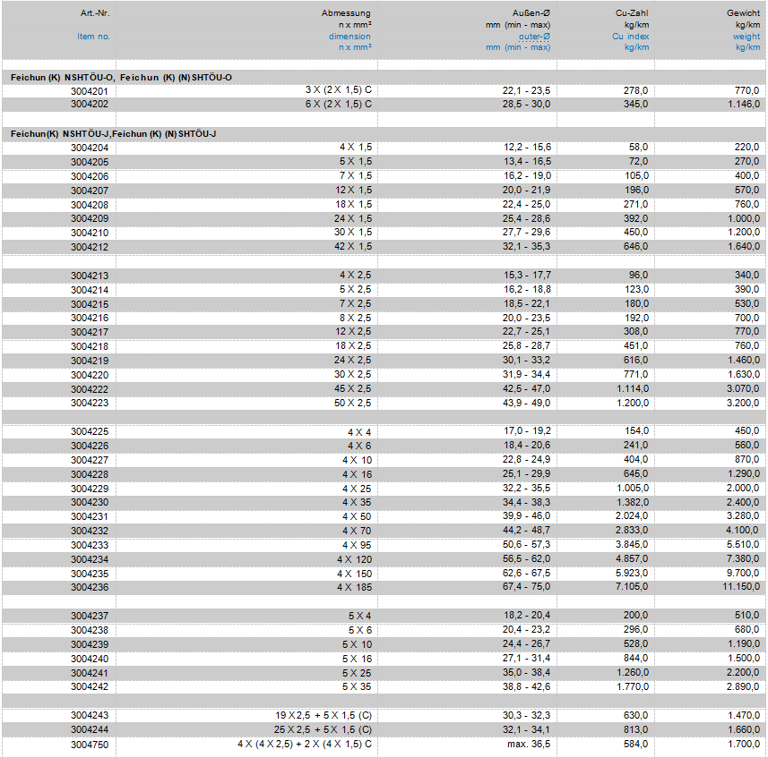📞+86 153 7530 2641 📧 hongjing.Wang@feichuncables.com

Reeling Cable for Winding Operations – (K) NSHTÖU & (N)SHTÖU Certified for Torsional and Tensile Stress Applications
Explore the features and applications of (K) NSHTÖU and (N)SHTÖU certified reeling cables, designed to withstand tensile and torsional stresses. Suitable for high-speed travelling up to 120 m/min in dry, humid, and outdoor environments. Learn about technical specifications, safety compliance, and more.
hongjing.Wang@Feichun
7/30/20258 min read


Introduction
In the dynamic world of industrial operations, reeling cables represent a critical component for applications requiring frequent winding and unwinding operations. These specialised cables are engineered to withstand the demanding conditions of continuous mechanical stress, making them indispensable for modern industrial, commercial, and agricultural facilities. The (K) NSHTÖU and (N)SHTÖU certified reeling cables stand at the forefront of this technology, offering superior performance characteristics that address the complex challenges of mobile power distribution systems.
The significance of these cables extends beyond simple power transmission. They are specifically designed to handle the triple challenge of tensile stress, torsional stress, and compulsory cable guidance systems that are characteristic of drum-wound applications. This unique combination of stresses occurs when cables are repeatedly wound onto drums or reels while simultaneously being subjected to pulling forces and rotational movements. The engineering excellence behind (K) NSHTÖU and (N)SHTÖU certified cables ensures reliable operation even under these demanding mechanical conditions.
Compliance with stringent industry standards is paramount in industrial cable applications, and these reeling cables excel in meeting both European directives and international safety requirements. The certifications represent not merely regulatory compliance, but a commitment to operational excellence and worker safety in challenging industrial environments.


Key Features of Reeling Cables
The fundamental strength of reeling cables lies in their exceptional resistance to both tensile and torsional stresses. Tensile stress resistance is crucial when cables are subjected to pulling forces during unwinding operations, particularly in applications where the cable must support its own weight over considerable distances. These cables are engineered to handle continuous tensile loads of up to 20 N/mm², ensuring reliable performance even under substantial mechanical loading conditions.
Torsional stress resistance is equally important, as cables experience twisting forces during winding and unwinding cycles. The specialised construction incorporates an open support braid made from polyester fibres, which provides torsional protection whilst maintaining flexibility. This innovative design prevents the internal conductors from becoming damaged due to repetitive twisting motions, significantly extending operational life.
The application versatility of these reeling cables is remarkable, with proven performance across diverse environmental conditions. They operate effectively in dry environments such as manufacturing facilities, humid conditions like those found in food processing plants, and wet environments including outdoor construction sites. This environmental adaptability is achieved through the use of special rubber compounds in both the core insulation and outer sheath, providing excellent moisture resistance and durability.
For outdoor and construction site applications, these cables demonstrate exceptional robustness. They withstand exposure to weather elements, mechanical abrasion, and the rough handling typical of construction environments. The black outer sheath not only provides UV resistance but also offers superior mechanical protection against impact and cutting forces commonly encountered in demanding work environments.
High-speed operation capability sets these cables apart from standard power cables. With proven performance at travelling speeds up to 120 metres per minute, they are ideally suited for modern automated systems where rapid deployment and retraction are essential. This high-speed capability is achieved through careful engineering of the cable's internal structure and the selection of materials that maintain their properties under dynamic loading conditions.


Applications of Reeling Cables
Industrial applications represent the primary market for these specialised reeling cables, with construction sites being particularly demanding environments. On construction sites, these cables power mobile equipment such as tower cranes, concrete pumps, and material hoists. The ability to withstand the constant winding and unwinding cycles, combined with resistance to environmental hazards, makes them indispensable for maintaining continuous power supply to critical construction equipment.
Commercial operations benefit significantly from the reliability of (K) NSHTÖU and (N)SHTÖU certified cables. In warehousing facilities, automated storage and retrieval systems rely on these cables for powering mobile equipment that operates continuously throughout multiple shifts. The cables' ability to maintain electrical integrity whilst being subjected to thousands of winding cycles ensures minimal downtime and maximum productivity.
Agricultural applications present unique challenges that these reeling cables address effectively. Modern farming operations utilise sophisticated irrigation systems, mobile processing equipment, and automated feeding systems that require reliable power distribution. The cables' resistance to moisture, chemicals commonly found in agricultural environments, and mechanical stresses from farming equipment makes them ideal for these applications.
Safe operation across diverse environments is a critical consideration in cable selection. These reeling cables are engineered to maintain their safety characteristics regardless of environmental conditions. Whether operating in the controlled environment of a manufacturing facility or the harsh conditions of an outdoor mining operation, the cables provide consistent performance whilst maintaining compliance with safety standards.
Detailed use cases in dynamic environments with heavy machinery demonstrate the cables' exceptional capabilities. In port operations, container handling cranes rely on these cables to power their lifting and positioning systems. The cables must withstand not only the mechanical stresses of continuous operation but also exposure to salt air and extreme weather conditions. Similarly, in mining operations, mobile equipment requires power cables that can handle the dual challenges of mechanical stress and exposure to harsh environmental conditions including dust, moisture, and chemical contaminants.
Specifications & Technical Details
The construction of these reeling cables begins with high-quality tinned copper strands conforming to Class 5 specifications according to DIN VDE 0295 and IEC 60228. This conductor class ensures maximum flexibility whilst maintaining excellent electrical conductivity. The tinning process provides additional protection against corrosion, particularly important in humid or chemically aggressive environments.
Core insulation utilises specialised rubber compounds specifically formulated for dynamic applications. This insulation system provides excellent electrical properties whilst maintaining flexibility throughout the cable's operational life. The conductor identification follows VDE 0293-308 standards, with coloured cores for cables up to 5 conductors and numbered black conductors with white markings for larger configurations, ensuring easy identification during installation and maintenance.
The cable's layered construction incorporates conductors stranded in layers, which distributes mechanical stresses evenly throughout the cable structure. An inner sheath of special rubber compound provides additional protection for the conductor bundle, whilst the torsional protection braid of polyester fibres offers crucial mechanical support during winding operations.
Voltage and temperature tolerances represent critical performance parameters for these cables. With a nominal voltage rating of Uo/U: 0.6/1 kV and a test voltage of 2.5 kV, these cables are suitable for most industrial power distribution applications. The operational temperature range extends from -40°C to +80°C for stationary installations and -25°C to +80°C for mobile applications, with conductor temperatures reaching up to +90°C under normal operating conditions.
Minimum bending radius specifications ensure proper installation and operation. For stationary installations, the minimum bending radius follows DIN VDE 0298 Part 3 requirements, whilst mobile applications have specific bending radius requirements that account for the dynamic nature of the installation. Oil resistance, certified according to EN60811-2-1, ensures reliable operation in industrial environments where exposure to hydraulic fluids and lubricants is common.
Current carrying capacity varies according to conductor cross-sectional area and installation conditions, with detailed specifications provided in technical annexes. These ratings ensure that cables can be properly sized for specific applications whilst maintaining safety margins required by electrical codes and standards.


Benefits of Choosing (K) NSHTÖU & (N)SHTÖU Certified Cables
Safety features represent the primary advantage of choosing certified reeling cables. RoHS compliance ensures that the cables are manufactured without hazardous substances, protecting both workers and the environment. CE marking confirms compliance with European Union directives, including the Low Voltage Directive 2014/35/EU, providing assurance of electrical safety and performance.
The self-extinguishing and flame retardant properties, certified according to IEC 60332-1, provide crucial fire safety benefits. In the event of electrical fault or external ignition source, these cables will not propagate flame, significantly reducing fire risk in industrial installations. This characteristic is particularly important in confined spaces or areas where evacuation might be difficult.
High mechanical strength and durability translate directly into reduced maintenance costs and improved operational reliability. The cables' ability to withstand repeated mechanical stress cycles without degradation means fewer cable replacements and reduced downtime for maintenance activities. This durability is particularly valuable in applications where cable replacement is difficult or expensive.
The freedom from lubricants and silicones during manufacturing (LBS-free/silicone-free) ensures compatibility with painting and bonding processes that might be required in the installation environment. This feature is particularly important in manufacturing environments where surface contamination could affect product quality.
Continuous tensile loading capability of up to 20 N/mm² provides confidence in applications where cables must support significant mechanical loads in addition to their electrical function. This specification ensures that cables can be used in applications where traditional power cables would fail due to mechanical stress.
Customisation capabilities allow for special configurations, alternative dimensions, cross-sections, and conductor and sheath colours to meet specific application requirements. This flexibility ensures that the cables can be optimised for particular installations whilst maintaining their certified performance characteristics.
Frequently Asked Questions
Q: What is the difference between (K) NSHTÖU and (N)SHTÖU certifications?
A: Both certifications indicate compliance with German VDE standards for reeling cables. The (K) designation typically refers to cables with enhanced mechanical properties, whilst (N)SHTÖU indicates standard mechanical performance. Both types offer identical electrical performance and safety characteristics, with the choice depending on specific mechanical stress requirements of the application.
Q: How do I determine the correct cable size for my application?
A: Cable sizing depends on several factors including electrical load, ambient temperature, installation method, and mechanical stress requirements. Consult the technical specifications for current carrying capacity under your specific installation conditions, and consider both electrical and mechanical load requirements when selecting conductor cross-sectional area.
Q: Can these cables be used in explosive atmospheres?
A: Standard (K) NSHTÖU and (N)SHTÖU cables are not certified for explosive atmospheres. Special variants with ATEX certification would be required for installations in potentially explosive environments. Consult with cable manufacturers for specific explosive atmosphere applications.
Q: What maintenance is required for reeling cables?
A: Regular visual inspection for signs of mechanical damage, checking of electrical connections, and verification of proper winding patterns on drums are essential. The frequency of inspection should be increased in harsh environmental conditions or high-cycle applications. Proper storage when not in use and adherence to minimum bending radius requirements will maximise cable life.
Q: Are these cables suitable for data transmission applications?
A: These cables are designed primarily for power transmission. For applications requiring both power and data transmission, consider hybrid cables that incorporate both power conductors and communication circuits in a single cable structure designed for reeling applications.
Conclusion
Reeling cables certified to (K) NSHTÖU and (N)SHTÖU standards represent the pinnacle of engineering excellence for demanding winding and unwinding applications. Their unique combination of electrical performance, mechanical strength, and environmental resistance makes them indispensable for modern industrial operations where reliability and safety are paramount.
The comprehensive range of conductor sizes and configurations ensures that these cables can meet the diverse requirements of construction sites, commercial facilities, and agricultural operations. From powering mobile cranes on construction sites to supporting automated systems in manufacturing facilities, these cables provide the reliability and durability that modern industry demands.
The relevance of (K) NSHTÖU and (N)SHTÖU certifications extends beyond mere regulatory compliance, representing a commitment to operational excellence and worker safety. By choosing certified reeling cables, operators can be confident that their power distribution systems will perform reliably under the most demanding conditions whilst maintaining the highest standards of electrical and mechanical safety.
Investment in quality reeling cables represents not just a purchase decision, but a strategic choice that impacts operational efficiency, maintenance costs, and safety performance throughout the cable's operational life. The superior engineering and proven performance of these certified cables ensure that they will continue to meet the evolving demands of modern industrial applications whilst providing the reliability and safety that operators require.
How to Reach Us
Get in Touch
SiteMap
Product Catalogue
Reeling Cable
Festoon Cable
Shore Power Cable




Scan to add us on WeChat
